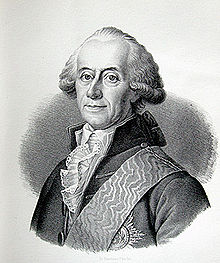- Andreas Peter Bernstorff
-
Andreas Peter Bernstorff (28 August 1735 – 21 June 1797) was a Danish statesman and politician. He was a Danish minister, father of Christian Günther von Bernstorff, and a guardian of civil and political liberty.
Contents
Background and early career
A. P. Bernstorff was born in Hanover as a nephew of the statesman Johann Hartwig Ernst von Bernstorff whose position probably introduced him to Danish politics. After a grand European tour he 1755 joined the Danish state service, first as a courtier and then from 1760 as a state official both in foreign political and financial matters. His career was slow but steady. During the 1760s he placed himself as an able but not outstanding official closely connected to his uncle. In the Struensee years 1770-71 he was dismissed but soon he was recalled by the new regime of Ove Høegh-Guldberg .
1773 Bernstorff was appointed Minister of Foreign Affairs and from then his real Danish career began. During this period he carried through the final solution of the Gottorp question during the exchange of real estate with the Russian Tsar family together with a Russian alliance. In general he supported a pro-Russian (but independent) line trying holding Sweden in neck and avoiding any conflict with England. He created an outstanding position for himself but also many enemies within the government. This was partly due to his alleged wilfulness partly due to political rivalry. The difficult years during the American War of Independence strengthened his wishes of an “active neutrality”. 1780 he had a great foreign political triumph by concluding a League of Neutrality with Russia and Sweden but at the same time concluding a special agreement with England that secured Danish trade. A deep but temporary Russian dissatisfaction with this last treaty was exploited by his Danish rivals and November 1780 he was dismissed by Guldberg.
1780-84 Bernstorff kept in the background as an interested observer of the political situation. He still enjoyed support in Copenhagen merchant circles and did not give up his political ambitions. Very early he was connected to Crown Prince Frederick (Frederick VI), he became a part of the conspiracy against Guldberg and 1784 he supported the coup d’état which made Frederick the Prince Regent.
Foreign Minister 1784-97
May 1784 Bernstorff was for second time made Minister of Foreign Affairs which opened his real golden age. Until his death he was in reality “prime minister” of Denmark, the leading man of the cabinet by whose advice the Prince Regent was normally guided. 1788-89 he was also temporarily the President of Danish Chancellery (Home Office).
In Scandinavian matters Bernstorff in this period carried on a cautious pro-Russian policy without clashing with Sweden. The Russo-Swedish War 1787-90 led to an abortive Danish participation 1788 of which he managed to escape without any open breaks. During the next years he gradually phased out the Russian alliance and tried to better the relations to Sweden.
The most important problem of Bernstorff in this period was the French Revolution and the wars in its wake. Also here he firmly maintained a neutral line and showed his special virtuosity of balancing between the great powers in order to protect the Danish trade. He strongly kept to the International Law but avoided provoking any parts. By this both strong and yet not rigid diplomacy he maintained the economic position of the Danish merchants and in spite of much problems with both France and England made his course respected. Among other things he firmly avoided a politics of convoy. At the same time he clearly refused taking any part in the intervention in France. This was probably due to his principally neutral line but also partly to his growing respect of national integrity.
Domestic politics and conclusion
First of all Bernstorff was the foreign politician but because of his leading role he clearly influed on domestic politics. Very early he was known as a supporter of the idea of independent farmers and though not its initiator he wholehearted supported the great agrarian reforms (the abolition of Adscription 1788) and also many of the reform laws of the 1790s. A loyal supporter of Danish absolutism, he was, however, in many ways a liberal by nature and the relative freedom of the press of this period was probably due to his wishes. His sympathies of England and of English political conditions – quite contrary to those of his uncle - also seem to have entered into it. His cultural interests were great but he did not have much influence here. As a German albeit using the Danish language he stood too far from Danish poetry.
Bernstorff is still considered one of the greatest Danish statesmen of the 18th century having today probably overshadowed his uncle. To his contemporaries his relatively early death was felt as a great misfortune – though it is impossible to decide whether he would have been able to maintain his political line. Being characterised a hot-tempered and cantankerous official as a young man he gradually seems to have emerged into a brilliant and adroit man of the world. In many ways he was one of the last representatives of the German aristocratic statesmen of Danish state service before the national reaction began.
Referencies
Dansk Biografisk Leksikon, vol. 2., 1980.
This article incorporates text from the public domain 1907 edition of The Nuttall Encyclopædia.
Categories:- 1735 births
- 1797 deaths
- People from Hanover
- People from the Electorate of Hanover
- University of Leipzig alumni
- University of Göttingen alumni
- 18th-century Danish people
- Government ministers of Denmark
Wikimedia Foundation. 2010.

